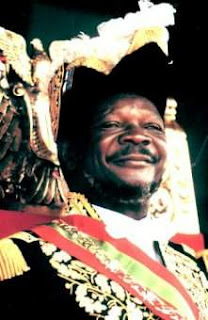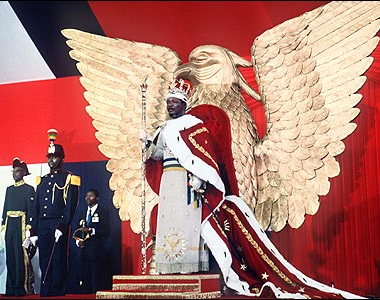 Jean-bedel Bokassa (22 Februari 1921 - 3 November 1996, juga dikenal sebagai Bokassa I dari Afrika Tengah dan Salah Eddine Ahmed Bokassa), seorang perwira militer, adalah kepala negara dari Republik Afrika Tengah dan negara penggantinya, Kekaisaran Afrika Tengah, dari kudeta nya pada 1 Januari 1966 hingga 20 September 1979. Periode ini, ia menjabat hampir sebelas tahun (1 Januari 1966 - 4 Desember 1976) sebagai presiden (presiden seumur hidup di 1972-1976), ia memerintah sebagai Kaisar. Meskipun Bokassa secara resmi dinobatkan pada bulan Desember 1977, gelar kekaisaran nya tidak mencapai pengakuan diplomatik di seluruh dunia.
Jean-bedel Bokassa (22 Februari 1921 - 3 November 1996, juga dikenal sebagai Bokassa I dari Afrika Tengah dan Salah Eddine Ahmed Bokassa), seorang perwira militer, adalah kepala negara dari Republik Afrika Tengah dan negara penggantinya, Kekaisaran Afrika Tengah, dari kudeta nya pada 1 Januari 1966 hingga 20 September 1979. Periode ini, ia menjabat hampir sebelas tahun (1 Januari 1966 - 4 Desember 1976) sebagai presiden (presiden seumur hidup di 1972-1976), ia memerintah sebagai Kaisar. Meskipun Bokassa secara resmi dinobatkan pada bulan Desember 1977, gelar kekaisaran nya tidak mencapai pengakuan diplomatik di seluruh dunia.Setelah itu pada tahun 1976 ia digulingkan dan Afrika Tengah dikembalikan ke nama mantan dan status sebagai Republik Afrika Tengah, dan mantan kaisar Bokassa pergi ke pengasingan. Ia kembali ke Afrika Tengah pada tahun 1986, diadili atas tuduhan pengkhianatan dan pembunuhan dan dihukum karena kejahatan ini pada tahun 1987, dan dipenjarakan pada tahun 1987 - 1993. Bokassa tinggal dalam kehidupan pribadi di ibukota, Bangui, sampai kematiannya pada bulan November 1996.
 Jean-Bédel Bokassa (22 February 1921 – 3 November 1996), also known as Bokassa I of Central Africa and Salah Eddine Ahmed Bokassa, was a military officer and the head of state of the Central African Republic and its successor state, the Central African Empire, from his coup d'état on 1 January 1966 until 20 September 1979. Of this period, he served almost eleven years (1 January 1966 – 4 December 1976) as president (president for life in 1972–1976), and for almost three years he reigned as self-proclaimed emperor (4 December 1976 – 20 September 1979). Following his overthrow, the Central African Republic was restored. Bokassa's imperial title did not achieve international diplomatic recognition.
Jean-Bédel Bokassa (22 February 1921 – 3 November 1996), also known as Bokassa I of Central Africa and Salah Eddine Ahmed Bokassa, was a military officer and the head of state of the Central African Republic and its successor state, the Central African Empire, from his coup d'état on 1 January 1966 until 20 September 1979. Of this period, he served almost eleven years (1 January 1966 – 4 December 1976) as president (president for life in 1972–1976), and for almost three years he reigned as self-proclaimed emperor (4 December 1976 – 20 September 1979). Following his overthrow, the Central African Republic was restored. Bokassa's imperial title did not achieve international diplomatic recognition.Born in French Equatorial Africa, the son of a village chief, Jean-Bédel Bokassa was orphaned at age 12. Educated in mission schools, he joined the French colonial army in 1939 as a private. He distinguished himself in the war in Indochina, winning medals and rising to the rank of captain. When French Equatorial Africa gained its independence as the Central African Republic in 1960, the new president David Dacko, who was his distant cousin, invited Bokassa to head the armed forces.[1] In 1966, Bokassa used his position to oust Dacko and declared himself president.
He then began a reign of terror, taking all important government posts for himself.[2] He personally supervised judicial beatings and introduced a rule that thieves would have an ear cut off for the first two offenses and a hand for the third. In 1977, in emulation of his hero Napoleon, he crowned himself emperor of the Central African Empire in a ceremony costing $20 million, practically bankrupting the country. His diamond-encrusted crown alone cost $5 million.[2] In 1979 he had hundreds of schoolchildren arrested for refusing to wear uniforms made in a factory he owned, and was reported to have personally supervised the massacre of 100 of the schoolchildren by his Imperial Guard.
On 20 September 1979, French paratroopers deposed him and re-installed Dacko as president. Bokassa went into exile in France where he had a chateau and other property bought with the money he had embezzled.[2] After his overthrow in 1979, Central Africa reverted to its former name and status as the Central African Republic. In his absence, he was tried and sentenced to death. He returned to the Central African Republic in 1986 and was put on trial for treason and murder. In 1987, he was cleared of charges of cannibalism, but found guilty of the murder of schoolchildren and other crimes. The death sentence was later commuted to life in solitary confinement, but just six years later, in 1993, he was freed. He lived a private life in his former capital, Bangui, and died in November 1996.






.jpg)
_1.jpg)




